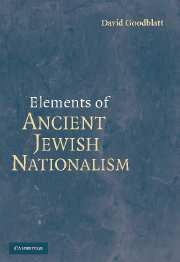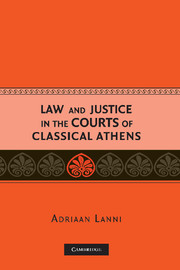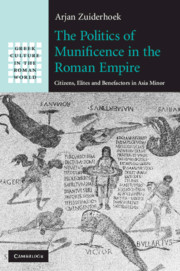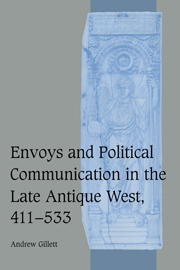Refine search
Actions for selected content:
23990 results in Ancient history
CHAPTER NINE - CONCLUSION
-
- Book:
- Social Mobility in Late Antique Gaul
- Published online:
- 18 December 2009
- Print publication:
- 20 July 2009, pp 336-344
-
- Chapter
- Export citation

Elements of Ancient Jewish Nationalism
-
- Published online:
- 20 July 2009
- Print publication:
- 04 September 2006
Frontmatter
-
- Book:
- Social Mobility in Late Antique Gaul
- Published online:
- 18 December 2009
- Print publication:
- 20 July 2009, pp i-iv
-
- Chapter
- Export citation
CHAPTER SIX - THE ACTIVE POOR: PAUPERES AT CHURCH
-
- Book:
- Social Mobility in Late Antique Gaul
- Published online:
- 18 December 2009
- Print publication:
- 20 July 2009, pp 213-249
-
- Chapter
- Export citation
INDEX
-
- Book:
- Social Mobility in Late Antique Gaul
- Published online:
- 18 December 2009
- Print publication:
- 20 July 2009, pp 369-379
-
- Chapter
- Export citation
CHAPTER EIGHT - HEALING AND AUTHORITY II: ENCHANTERS
-
- Book:
- Social Mobility in Late Antique Gaul
- Published online:
- 18 December 2009
- Print publication:
- 20 July 2009, pp 283-335
-
- Chapter
- Export citation
CHAPTER ONE - INTRODUCTION: BARBARIAN GAUL
-
- Book:
- Social Mobility in Late Antique Gaul
- Published online:
- 18 December 2009
- Print publication:
- 20 July 2009, pp 1-22
-
- Chapter
- Export citation
CHAPTER FIVE - THE PASSIVE POOR: PRISONERS
-
- Book:
- Social Mobility in Late Antique Gaul
- Published online:
- 18 December 2009
- Print publication:
- 20 July 2009, pp 180-212
-
- Chapter
- Export citation
CHAPTER FOUR - SOCIAL STRUCTURE II: FREE AND SERVILE RANKS
-
- Book:
- Social Mobility in Late Antique Gaul
- Published online:
- 18 December 2009
- Print publication:
- 20 July 2009, pp 129-179
-
- Chapter
- Export citation
ABBREVIATIONS
-
- Book:
- Social Mobility in Late Antique Gaul
- Published online:
- 18 December 2009
- Print publication:
- 20 July 2009, pp ix-x
-
- Chapter
- Export citation
Gaul in the Late Sixth Century
-
- Book:
- Social Mobility in Late Antique Gaul
- Published online:
- 18 December 2009
- Print publication:
- 20 July 2009, pp xi-xii
-
- Chapter
- Export citation

Law and Justice in the Courts of Classical Athens
-
- Published online:
- 18 July 2009
- Print publication:
- 27 February 2006

The Politics of Munificence in the Roman Empire
- Citizens, Elites and Benefactors in Asia Minor
-
- Published online:
- 15 July 2009
- Print publication:
- 27 April 2009

Envoys and Political Communication in the Late Antique West, 411–533
-
- Published online:
- 12 July 2009
- Print publication:
- 28 August 2003
Introduction
-
- Book:
- Asceticism in the Graeco-Roman World
- Published online:
- 22 January 2010
- Print publication:
- 02 July 2009, pp 1-8
-
- Chapter
- Export citation
Bibliography
-
- Book:
- Asceticism in the Graeco-Roman World
- Published online:
- 22 January 2010
- Print publication:
- 02 July 2009, pp 158-176
-
- Chapter
- Export citation
2 - Asceticism in Hellenistic and Rabbinic Judaism
-
- Book:
- Asceticism in the Graeco-Roman World
- Published online:
- 22 January 2010
- Print publication:
- 02 July 2009, pp 34-57
-
- Chapter
- Export citation
1 - Pagan asceticism: cultic and contemplative purity
-
- Book:
- Asceticism in the Graeco-Roman World
- Published online:
- 22 January 2010
- Print publication:
- 02 July 2009, pp 9-33
-
- Chapter
- Export citation
5 - Cavemen, cenobites, and clerics
-
- Book:
- Asceticism in the Graeco-Roman World
- Published online:
- 22 January 2010
- Print publication:
- 02 July 2009, pp 131-155
-
- Chapter
- Export citation
Contents
-
- Book:
- Asceticism in the Graeco-Roman World
- Published online:
- 22 January 2010
- Print publication:
- 02 July 2009, pp ix-ix
-
- Chapter
- Export citation
